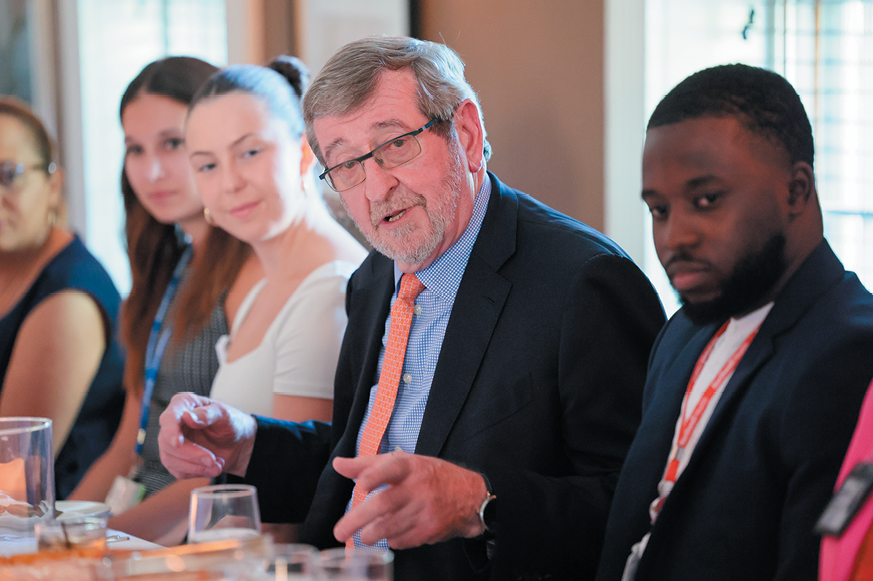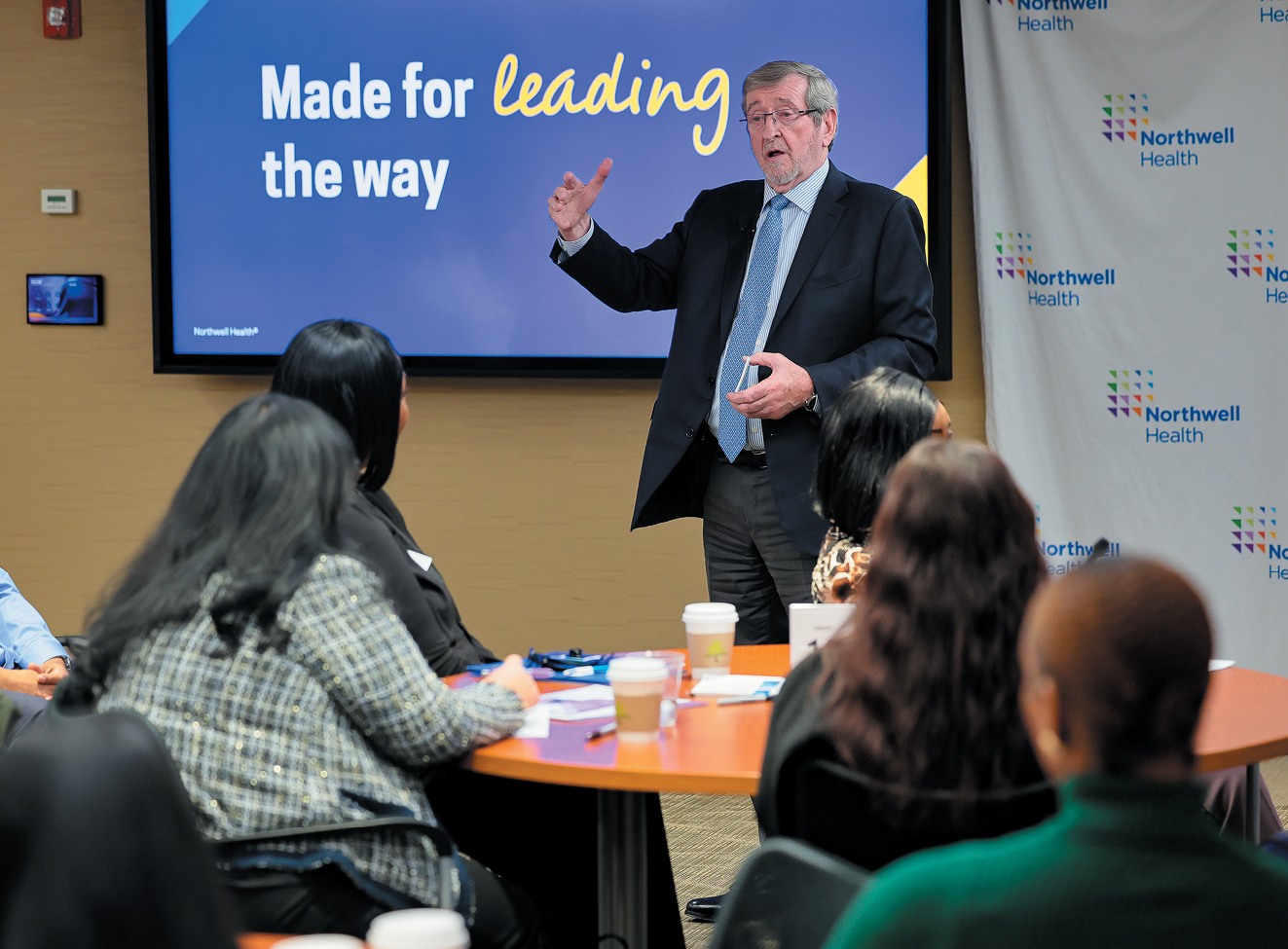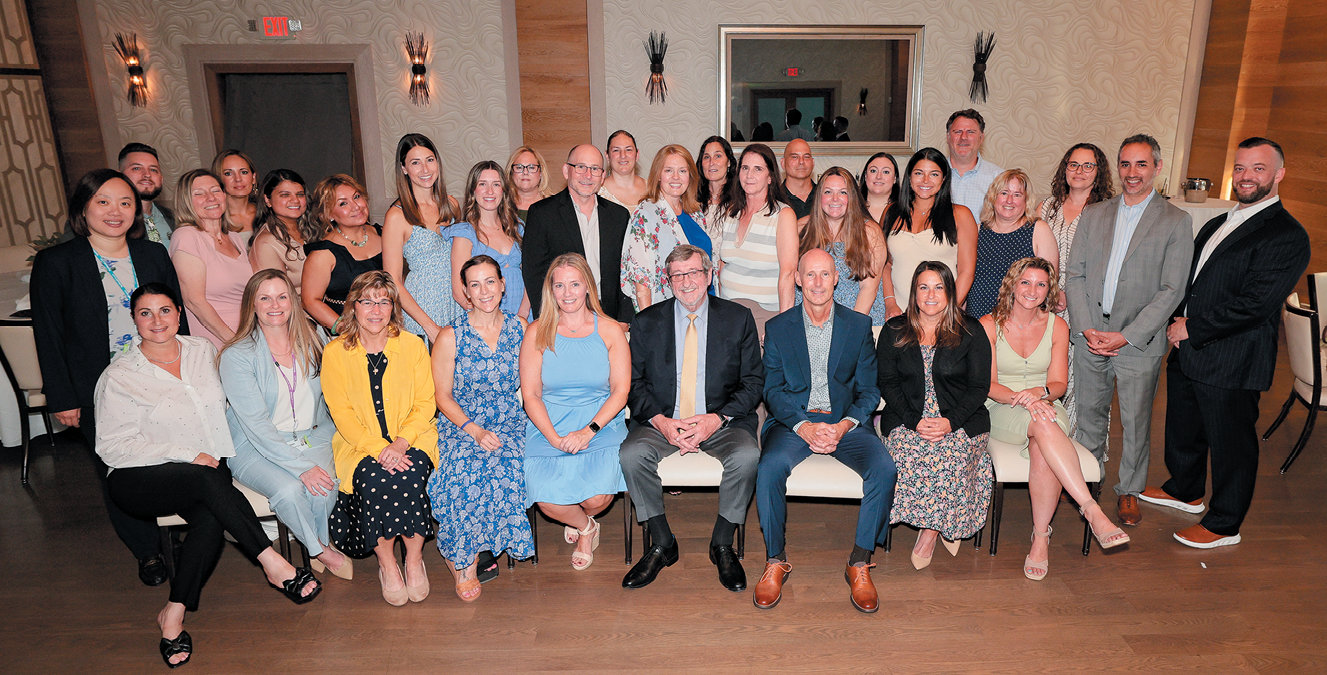- Home
- Media Kit
- MediaJet
- Current Issue
- Past Issues
- Ad Specs-Submission
- Reprints (PDF)
- Photo Specifications (PDF)
- Contact Us
- PRIVACY POLICY
- TERMS OF USE
![]()
ONLINE
![]()
ONLINE

Creating The Future
Editors’ Note
Michael Dowling is one of healthcare’s most influential voices, taking a stand on societal issues such as gun violence and immigration that many health system CEOs shy away from. His leadership has been invaluable to Northwell’s consistent expansion and prominence. In March 2020, he successfully navigated the health system through the first COVID-19 epicenter in the U.S., detailing Northwell’s experiences in a book titled, Leading Through a Pandemic: The Inside Story of Humanity, Innovation, and Lessons Learned During the COVID-19 Crisis. Overall, Northwell treated more than 300,000 COVID patients during the first two years of the pandemic – more than any other U.S. health system.
Prior to becoming CEO in 2002 and joining Northwell in 1995, Dowling served in New York State government for 12 years, including seven years as State Director of Health, Education, and Human Services and Deputy Secretary to former Governor Mario Cuomo. He was also Commissioner of the State Department of Social Services. Before entering public service, he was a Professor of Social Policy and Assistant Dean at the Fordham University Graduate School of Social Services and Director of the university’s Westchester County campus. Dowling has been honored with many awards and recognitions over the years, including the Ellis Island Medal of Honor, the Presidential Distinguished Service Award for the Irish Abroad, the Alfred E. Smith Award from the American Society for Public Administration, the National Human Relations Award from the American Jewish Committee, and the Foreign Policy Association Medal Award. In 2017, he was selected to serve as the Grand Marshal of New York’s St. Patrick’s Day Parade. In 2022, he was named the most influential leader in healthcare by Modern Healthcare, ranking number 1 in its annual list of the “100 Most Powerful People in Healthcare,” a list on which he has been featured for 18 consecutive years.
Dowling is a member of the Institute of Medicine of the National Academies of Sciences, the Foreign Policy Association, and the North American Board of the Smurfit School of Business at University College, Dublin, Ireland. He is past chair and a current board member of the National Center for Healthcare Leadership (NCHL), the Greater New York Hospital Association, the Healthcare Association of New York State, the Healthcare Institute, and the Institute for Healthcare Improvement (IHI). Dowling was an instructor at the Center for Continuing Professional Education at the Harvard School of Public Health. He earned his undergraduate degree from University College Cork (UCC), Ireland, and his master’s degree from Fordham University. He also has honorary doctorates from the prestigious Queen’s University Belfast, University College Dublin, Hofstra University, Dowling College, and Fordham University.
Institution Brief
Northwell Health (northwell.edu) is a clinical, academic, and research enterprise with a workforce of about 90,000 and annual revenue of nearly $20 billion. Northwell is the largest healthcare provider and private employer in New York State, caring for more than two million people annually through a vast network of 21 hospitals, more than 950 outpatient facilities, including 75 urgent care centers, as well as home care, rehabilitation, and end-of-life programs. Northwell also pursues pioneering research at the Feinstein Institutes for Medical Research and a visionary approach to medical education highlighted by the Zucker School of Medicine, the Hofstra Northwell School of Nursing and Physician Assistant Studies, and one of the nation’s largest medical residency and fellowship programs.

Michael Dowling converses with Northwell employees
during a monthly dinner centering around employee
communication where questions are answered on
wide-ranging topics
How do you describe Northwell Health’s culture and values?
Good organizations are primarily the result of having employees and leaders with the right set of values and behaviors. It’s so important. To repeat the common phrase – “culture eats strategy for lunch.” At Northwell, we prioritize the values of decency, respect, integrity, honesty, tolerance, truth, and teamwork. They are emphasized constantly. It’s about building community and fully appreciating their interdependence. Success is not a solo endeavor. If you deviate from those values, your tenure at Northwell will be brief. I discuss them in detail each Monday when I spend time with all new employees at an orientation session we call “Beginnings.” Leaders at all levels of the organization must, of course, be constant promotors and guardians of those values.
What have been the keys to Northwell Health’s industry leadership, and how do you define the Northwell Health difference?
We are constantly promoting innovation and entrepreneurship, and creating an environment where employees find joy and satisfaction in their work. I have always believed that employees who work in healthcare don’t have a job – they have an obligation and a responsibility. I believe our culture is distinctive but so is our comprehensive commitment to the broader community. We believe in optimizing everyone’s talents, embracing diversity, and speaking out on social issues such as gun violence – the leading cause of death for kids and adolescents – that impact public health. One other distinction is that we provide all services from birth to end-of-life, creating a lifelong continuum of care and support. We also embrace competition, which always makes you better, and we see the status quo as our greatest competitor. We believe in managing the present and creating the future.

Each Monday, Michael Dowling welcomes new employees
during a session of information and answering questions
How critical has it been to maintain culture as Northwell Health has grown in size and scale?
As large as we’ve grown, maintaining the culture that we’ve built over the past three decades is extremely critical and has to be a continuous central priority. It requires constant attention. Culture is the personality of the organization – it exemplifies how you behave, how you act, how people work together, how the organization is perceived, and how customers and employees experience it. This is especially important when the growth is the result of acquisitions or mergers – since our new partners often have distinctive cultures and histories. The goal is to create an overarching, unified culture and method of operations while preserving the essence of the new partner’s culture. It’s a difficult but necessary balance.
“At Northwell, we prioritize the values of decency, respect, integrity, honesty, tolerance, truth, and teamwork.”
How important is it to balance techno-
logical advances, especially AI, with the need to maintain the human touch?
This is a crucial issue as we move forward, especially in the healthcare profession. AI has enormous potential to enhance efficiency and decision-making, perform certain tasks and analyze data. But it cannot build culture, express emotion and feelings, provide meaning and purpose, express the power of relationships and inspire trust. Healthcare and all businesses depend on people for their success. How to best blend AI intelligence with human ingenuity and marrying the machine brain with the human brain is an experiment that we will be trying to actualize for years to come. The power of human relationships and socialization, the power of a handshake and eye contact, are so important to the treatment and healing process. AI and other technologies are only part of the answer.
Will you discuss Northwell Health’s commitment to invest in diverse talent?
We live in a world of diversity. Each Monday morning, I spend 2 ½ hours meeting all new employees – about 250 per week. In that room are people of every color, every ethnicity, every religion, and from every corner of the world. This is our strength and something to celebrate and be proud of. Each brings different talents and perspectives. Our responsibility, if we desire to be successful, is to optimize and release those competencies. It is a major priority at Northwell – we hire, promote, train, and educate the best and by doing so we become the best.

Monthly dinner welcoming members of Eastern region.
Dinners are meant to encourage free flowing dialogue
and discussion with questions open to any topic
What has made it such a priority for you to personally be engaged in Northwell Health’s hiring and recruitment efforts?
We have a robust human resource (HR) organization that operates and continually enhances our hiring and recruitment infrastructure. I am involved at a high level, mainly setting the expectations, but I still make it a priority to meet all new hires each week, which I have been doing continuously for 23 years. It’s important from a number of perspectives: it gives employees contact with leadership and information about the history, mission, values, and expectation of the organization. They get an enhanced perspective on their roles and responsibilities, and they get a better understanding of how the business is organized and structured. For me personally, I get a bird’s-eye view of who we are recruiting. Two hundred and fifty new employees per week is a lot – it’s important to make sure that they are the right fit. We get it right most of the time.
How important is it for you to be at the facilities with your workforce and to be constantly communicating your vision and plans for Northwell Health?
The worst place for a CEO to be is in his or her office all the time. That’s not where the important work happens – it’s on the floors and on the front lines. To know what’s going on, leaders must make the time to walk around, engage with staff, and get unfiltered feedback. I routinely meet with employees for breakfast, lunch and dinner. Being accessible, enhancing trust and building relationships are so necessary. It’s also part of the process of narrowing the gap between those in the C-suite and on the front lines, and it facilitates the constant communication that employees want and appreciate. Face-to-face, person-to-person communications and visibility are far superior to relying on emails and texts. When other CEOs ask me how I find the time, I ask, “what’s more important?” Your employees are your greatest asset.

Always engaging with Northwell employees,
Michael Dowling participates in a group photo
with staff members who were involved in the
One South Netflix series
What do you tell young people about the type of career the industry offers?
This is a question that comes up almost every week at our employee orientation sessions. Because we are so large, it is difficult to list a career option that Northwell cannot provide. It’s a candy store of opportunity, and where you begin is no predictor of where you can end up. The list is long. Career opportunities exist in finance, technology, food service, construction, real estate, nursing, PT, education, research, and countless other areas. And we have services and people who can provide support, coaching, and mentoring to help you succeed in whatever career you want to pursue.
At Northwell, we work with dozens of high schools to introduce young people to potential career opportunities, and provide hundreds of internships and apprenticeships each year. This year we will be doing something particularly unique: in partnership with the NYC Department of Education and Bloomberg Philanthropies, we are opening the Northwell School of Health Sciences in Queens this fall. The high school curriculum is being modified to provide a focus on nursing, medical assistants, diagnostic medicine, physical therapy, and mental health. These pathways provide career options for students while also creating a talent pipeline for the future healthcare workforce.![]()